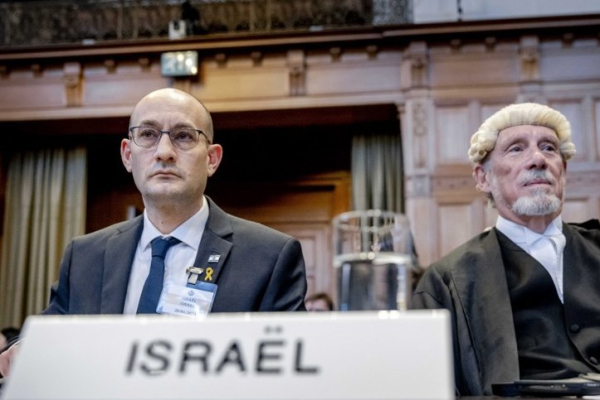No verdict yet on charges of genocide

1 of 4 | Gilad Noam, Deputy Attorney-General for International Affairs for Israel (L), and lawyer Malcolm Shaw, look on during a ruling by the International Court of Justice in The Hague, The Netherlands, on a request by South Africa for emergency measures for Gaza on Friday. Photo by Remko de Waal/EPA-EFE
The International Court of Justice in the Hague ordered Israel to take immediate steps to end atrocities in Gaza amid its ongoing war with Hamas, but stopped short of suspending the country’s devastating military campaign that has killed tens of thousands of Palestinian civilians.
The court did not issue a verdict on the charges of genocide, which Israel and the United States have blasted as baseless and outrageous. And any finding of genocide by the court would result in a prosecution that could take several years to play out. Advertisement
The interim ruling issued by the panel of 15 judges on Friday established six provisional measures that Israel must undertake to prevent further potential genocidal acts by its military.
The measures are designed to ensure further humanitarian access to the region as the war continues. Advertisement
Following the ruling, Prime Minister Benjamin Netanyahu called the charges ridiculous and vowed to continue the invasion in Gaza until Hamas is annihilated.
He added that Israel will “continue to defend ourselves and our citizens while adhering to international law.”
The ruling came on the heels of a two-day genocide trial earlier this month, in which South African government attorneys accused Israel of war crimes while urging the top court of the United Nations to order the Israeli military out of Gaza.
Two weeks after the hearing, the court sought to prevent further genocidal acts as the body continues to consider whether Israel had violated the Convention on the Prevention and Punishment of the Crime of Genocide.
The U.N.-sponsored human rights treaty — signed in 1948 by Israel, South Africa and other nations — was established in the wake of the Holocaust to prevent future instances of genocide after several million Jews were systematically murdered by the Nazis during World War II.
The treaty defines genocide as “acts committed with intent to destroy, in whole or in part, a national, ethnical, racial or religious group.”
Palestinian foreign minister Riyad al-Maliki hailed the ruling, saying the justices on the international court ruled “in favor of humanity and international law.” Advertisement
The case comes nearly 16 weeks after the Oct. 7 attack by Hamas, which led to an all-out invasion by the Israeli military that has killed about 25,000 Palestinian civilians, including 6,000 children, according to estimates by the Gaza Ministry of Health.
By comparison, only 9,000 Hamas militants are believed to be killed so far in the conflict, while about 1,200 Israelis were killed during the opening salvo by Hamas.
A simultaneous hostage crisis also emerged as more than 200 Israeli civilians were taken captive during the deadliest attack in its territory since the country was established.
Despite a pair of brief cease-fires to free more than 100 hostages, the war continues unabated as diplomats from several nations scramble behind the scenes in pursuit of a long-term peace agreement.
CIA director Bill Burns is planning to meet with officials from Israel, Qatar and Egypt in the coming days to discuss another potential cease-fire.
During opening statements, South African government lawyers accused Israel of intentionally targeting Palestinian families and children, demonstrating a “pattern of genocide.”
The attorneys also argued that the latest Middle East war brought to light decades of Israeli oppression against Palestine, which amounted to a “plausible claim of genocidal acts.” Advertisement
Israeli military leaders maintain they are abiding by international law and making every effort to minimize harm to civilians in areas where Hamas operates underground.